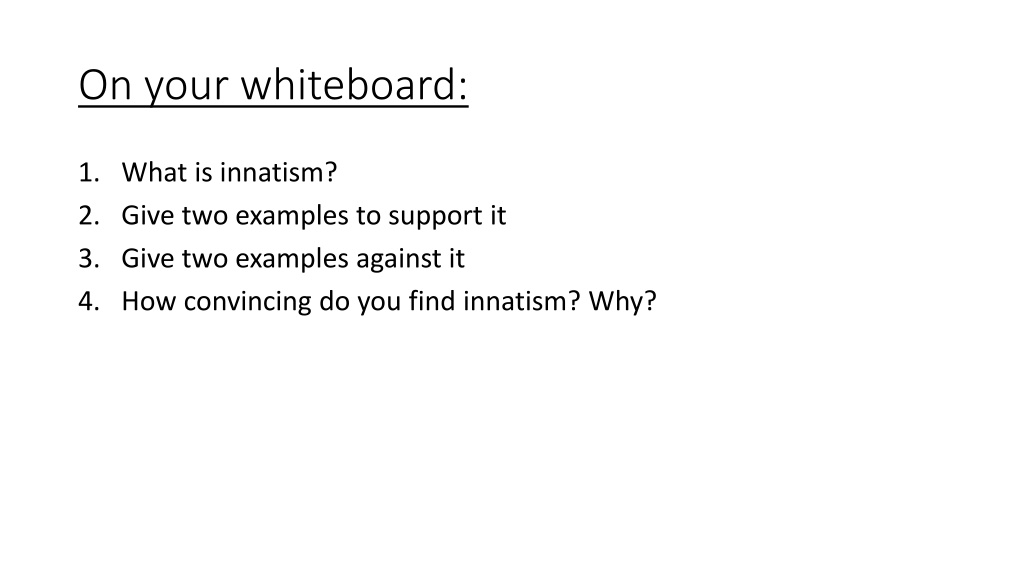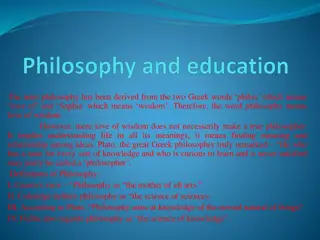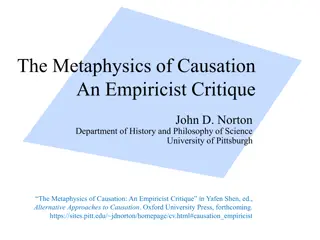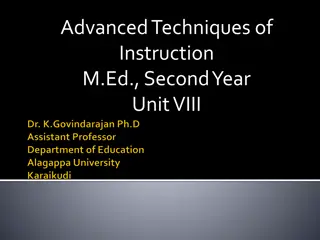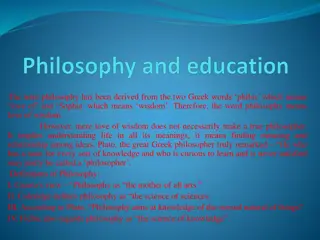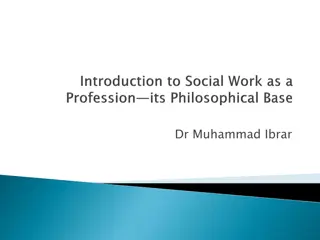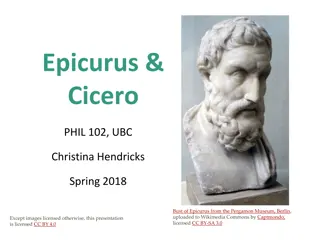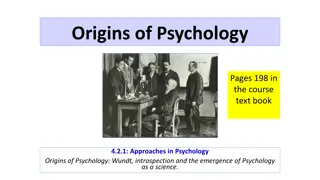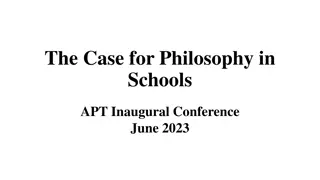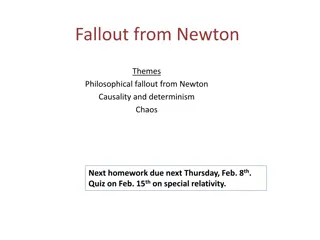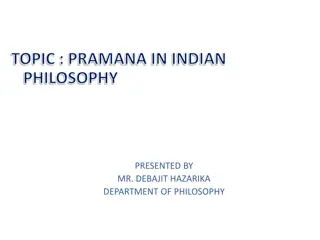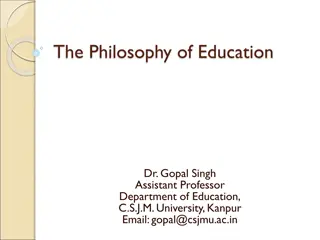Exploring Innatism vs. Empiricism in Philosophy
Innatism posits that certain ideas or concepts are innate to the mind, while Empiricism suggests that all ideas stem from sensory experiences. This discussion delves into the arguments for and against innatism, provides examples supporting each view, and questions the persuasiveness of innatism in understanding the origin of concepts.
Download Presentation

Please find below an Image/Link to download the presentation.
The content on the website is provided AS IS for your information and personal use only. It may not be sold, licensed, or shared on other websites without obtaining consent from the author. Download presentation by click this link. If you encounter any issues during the download, it is possible that the publisher has removed the file from their server.
E N D
Presentation Transcript
On your whiteboard: 1. What is innatism? 2. Give two examples to support it 3. Give two examples against it 4. How convincing do you find innatism? Why?
Concept Empiricism Concept Empiricism The view that all concepts (ideas) are derived from sense experience. Key points? Ideas caused by sense experiences separate from them Can have concept of things we ve never experienced But only if we ve experienced the elements that make it up Is it possible to think of a brand new idea?
Concept Empiricism Concept Empiricism Mixing and Matching Mixing and Matching although our thought seems to be so free, when we look more carefully we ll find that it is really confined within very narrow limits, and that all this creative power of the mind amounts merely to the ability to combine, transpose, enlarge, or shrink the materials that the senses and experience provide us with. - Hume
Tabula Rasa Tabula Rasa The mind is like a blank slate The sense organs allow us to gain experiences. These experiences are imprinted in the mind as ideas. Think: How intuitive is this explanation of the origin of concepts?
Ideas without experiences Ideas without experiences One result of the Tabula Rasa view is that individuals without working sense organs will be unable to form ideas associated with that sense organ. Do you agree?
Quick Tasks Quick Tasks 1. Is it possible to imagine a brand new colour you ve never experienced before? 2. Construct your own alien or made-up creature and then identify how your construction is derived from your experience. 3. Can you think of any ideas that are not ultimately derived from experience?
Impressions & Ideas Hume s Argument If it happens, from a defect of the organ, that a man is not susceptible of any species of sensation, we always find that he is as little susceptible of the correspondent ideas. A blind man can form no notion of colours; a deaf man of sounds. Restore either of them that sense in which he is deficient; by opening this new inlet for his sensations, you also open an inlet for the ideas; and he finds no difficulty in conceiving these objects. Locke: the concepts come from sensation (experience via the senses) or reflection (awareness of our own thoughts) Hume: The concept is a faint copy of the original sense impression, which is caused by the object or event (e.g. coldness, snow)
Simple and Complex Concepts Simple impression (the sight of the colour brown) Simple idea (the idea of brown) causes For both Locke and Hume, simple concepts come from simple impressions, and complex concepts are built from combining these simple concepts. Simple impression (the colour brown) Complex idea (the idea of tea) Together causes Simple impression (the smell of tea) causes Complex impression (painting of a cuppa) Simple impression (the taste of tea)
Simple and Complex Concepts So, concept empiricism is the view that all of our concepts are derived from sense impressions, either directly (in the case of simple concepts) or by being made up of other concepts that are based on sense impressions (in the case of complex concepts). Simple impression (the sight of the colour brown) Simple idea (the idea of brown) causes Simple impression (the colour brown) Complex idea (the idea of tea) Together causes Simple impression (the smell of tea) causes Complex impression (painting of a cuppa) Simple impression (the taste of tea)
Humes extreme concept empiricism: If you think you have a concept, but can t trace it back to an impression, then it is not a concept at all! Although you may have a word for it, that word doesn t actually mean anything. Examples? (Clue: Hume was an atheist)
3 most important things youve learned about concept empiricism?
Think-Pair-Share How convincing do you find concept empiricism? Write as many strengths and weaknesses as you can.
Explain concept empiricism using the words below: Tabula rasa new ideas sense impressions concepts Locke simple ideas and complex ideas Hume s copy principle extreme concept empiricism
Humes arguments for Concept Empiricism Anyone who has never had a certain impression (eg. a blind person) can not form the corresponding idea. Therefore, impressions are necessary for ideas. For any concept we have, we can trace its origin back to an impression we had. Therefore, impressions are sufficient for ideas.
Key Questions to assess empiricism: Are impressions really necessary for ideas? What kind of thing would be a counter-example? Are impressions really sufficient for ideas? What kind of thing would be a counter-example?
Humes example the missing shade of blue Can you imagine the missing shade? What does this tell us about concept empiricism?
Humes example the missing shade of blue The problem here for the empiricist is that if you can form an idea of the missing shade of blue it means that it is possible to form an idea which has no corresponding impression, and this goes against their principle that nothing can exist in the mind that has not come through the senses.
Humes actual response: A better empiricist response: Most people, I think, will agree that he can. This seems to show that simple ideas are not always, in every instance, derived from corresponding impressions. Still, the example is so singular that it s hardly worth noticing, and on its own it isn t a good enough reason for us to alter our general maxim. We can form an idea of that particular shade by combining the idea of BLUE with the ideas of DARKNESS or LIGHTNESS. So it s not actually a simple concept!
Problem with this empiricist response? If the idea of this shade is a complex one, isn t every blue idea a complex one? Every example of blue is of a particular shade (dark-blue, turquoisey-blue, sky-blue etc.) So could we ever have a simple idea of blue? If we couldn t have a simple idea of blue, then we couldn t combine it with anything to form a complex idea of a particular shade.
An alternative empiricist response: The empiricist can claim that we can t in fact imagine the missing shade. Then they can stick with the copy principle. Hume didn t want to do this though. He thought we could imagine it. Are any of the empiricist responses good enough? Can Hume claim that we could imagine the missing shade of blue and still maintain the copy principle?
On whiteboards: Think of some words that don t have sense impressions connected to them Tip: if you re struggling, look for words in the sentence above!
Logical connectives Imagine a cat sitting on a mat. Your idea of the cat, the mat, and of sitting all derive from impressions. But what about the idea of on-ness? What sense impression is this a copy of?
Logical connectives Logical connectives are words such as: Possibly If Not Either Most Can the empiricist claim that these ideas are copies of sense impressions?
This is tove What does What does tove tove mean? mean?
What does this tell us about sense impressions and ideas? Sense impressions are not sufficient for ideas! E.g. Tove : you have the sense impression, but this isn t enough to give you the right concept. You need someone to explain which aspect of the sense impression the word is referring to. So, we need more than just the sense impression itself to give us the concept/idea.
Are sense impressions sufficient for forming concepts/ ideas? Lots of other concepts seem to require a certain context / explanation on top of sense impressions. E.g. justice . Maybe there are sense impressions that are relevant, but you need other information in order to form the concept. And this other information isn t in the form of sense impressions. So, some concepts require something else in addition to sense impressions.
2 sentences on whiteboards: What do the two examples (the missing shade of blue, and logical connectives) tell us about sense impressions and ideas? We seem to be able to form certain ideas without relying on any particular sense impression. So, sense impressions are not necessary for ideas. They re also not sufficient for ideas because we sometimes need more than a sense experience / impression in order to form an idea (connectives / tove).
